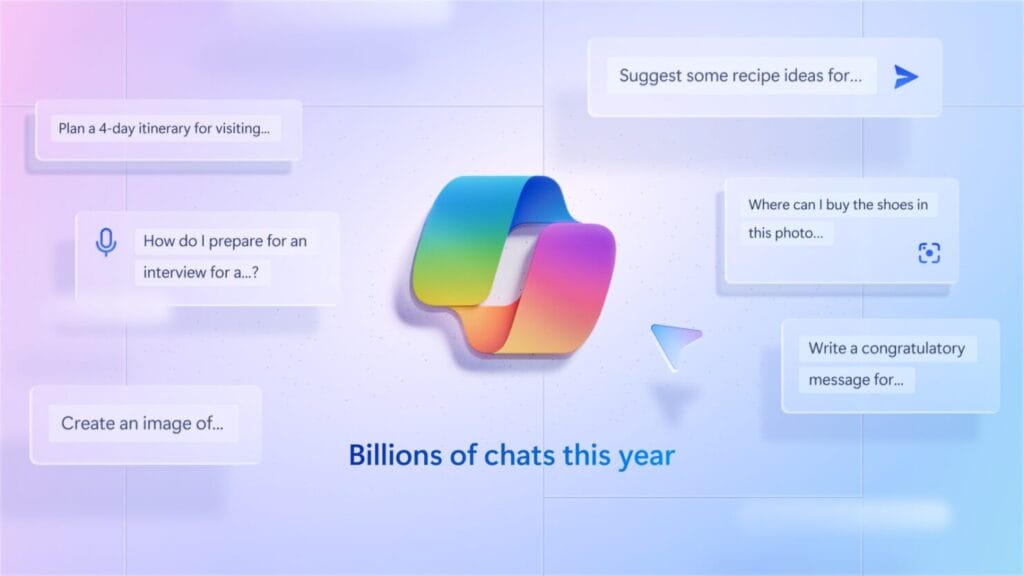Microsoft announced last week that they will be integrating a new keyboard key to all new Windows 11 models and beyond, allowing users to quickly access artificial intelligence models to help the user complete a number of tasks. This is the major change to the standard Microsoft keyboard in 30 years.
CNBC reported: ‘Copilot in Windows taps artificial intelligence models from Microsoft-backed startup OpenAI, which operates its own popular ChatGPT chatbot. It can compose human-like text in response to a few words of written input. People can tell it to write out emails, answer questions, create images and turn on PC features. Workers in businesses that pay for Copilot for Microsoft 365 can receive highlights of Teams chats and get help with writing Word documents.’

‘Microsoft has started delivering Copilot on PCs with Windows 10, the world’s most popular operating system, and Windows 11. People can hold down the Windows key and push the C key to summon the Copilot,’ CNBC added. Now Microsoft is dedicating a new key for it.
Microsoft provides more details in a blog post published on January 4th:
Today, we are excited to take the next significant step forward and introduce a new Copilot key to Windows 11 PCs. In this new year, we will be ushering in a significant shift toward a more personal and intelligent computing future where AI will be seamlessly woven into Windows from the system, to the silicon, to the hardware. This will not only simplify people’s computing experience but also amplify it, making 2024 the year of the AI PC.
The platform shift driven by AI innovation continues to grow rapidly and powerfully, fundamentally changing the way we use technology across work and life. At Microsoft, we are committed to empowering people and organizations to adapt and thrive in this new age of AI.
Over the last year, we have been at the forefront of this shift, innovating and improving our product experiences with Copilot, your everyday AI companion, at the center. From reinventing the way people search with Copilot in Bing, and unlocking productivity with Copilot for Microsoft 365, to reimagining how people get things done on the PC with Copilot in Windows, we’ve listened to feedback and doubled down to create an experience that helps people every day. We’re also seeing incredible momentum from our silicon partners AMD, Intel and Qualcomm, all of whom have introduced their latest silicon innovations to the world that unlock new AI experiences on the Windows PC. Together, we’re putting new system architectures in place to power new Windows AI experiences bringing together the GPU, CPU, NPU and the cloud.
We are energized by the stories that have been shared on how Copilot has inspired and empowered people across the last year – and we know our work is never done in our relentless pursuit to continue to innovate on behalf of our customers.
The introduction of the Copilot key marks the first significant change to the Windows PC keyboard in nearly three decades. We believe it will empower people to participate in the AI transformation more easily. The Copilot key joins the Windows key as a core part of the PC keyboard and when pressed, the new key will invoke the Copilot in Windows experience to make it seamless to engage Copilot in your day to day*. Nearly 30 years ago, we introduced the Windows key to the PC keyboard that enabled people all over the world to interact with Windows. We see this as another transformative moment in our journey with Windows where Copilot will be the entry point into the world of AI on the PC.
Over the coming days leading up to and at CES, you will start to see the Copilot key on many of the new Windows 11 PCs from our ecosystem partners, with availability beginning later this month through Spring, including on upcoming Surface devices.
We are excited to take the next step on our journey. There’s never been a better time to get started with Copilot today, whether it’s turning your ideas into songs, creating beautiful images and polished drafts to adjusting your PC settings, Copilot is your everyday AI companion for work and life. To learn more visit this link.
As we embark on this new year, we are filled with optimism and excitement. We will continue to build Windows to be the destination for the best AI experiences. This will require an operating system that blurs the lines between local and cloud processing. The year ahead promises to be nothing short of extraordinary!
AUTHOR COMMENTARY
I mention this because this integration marks the point at which those who were once skeptical about using AI, will now be basically goaded into using it and accepting it, as it now just a key press away from AI thinking and doing for you.
Of course, within this collective AI revolution, hardly a peep has been spoken of about just how dumb and fickle people will become as they rely more and more on AI. But I’m sure several years from now the headline news will be that national IQ points dropped like an anvil, now that most people have accepted it and depend on it for them to think and operate.
The hand of the diligent shall bear rule: but the slothful shall be under tribute.
Proverbs 12:24
[7] Who goeth a warfare any time at his own charges? who planteth a vineyard, and eateth not of the fruit thereof? or who feedeth a flock, and eateth not of the milk of the flock? [8] Say I these things as a man? or saith not the law the same also? [9] For it is written in the law of Moses, Thou shalt not muzzle the mouth of the ox that treadeth out the corn. Doth God take care for oxen? [10] Or saith he it altogether for our sakes? For our sakes, no doubt, this is written: that he that ploweth should plow in hope; and that he that thresheth in hope should be partaker of his hope. (1 Corinthians 9:7-10).
The WinePress needs your support! If God has laid it on your heart to want to contribute, please prayerfully consider donating to this ministry. If you cannot gift a monetary donation, then please donate your fervent prayers to keep this ministry going! Thank you and may God bless you.








Bill Gates screwed up the regular keyboard several years ago by shifting the keys one key to the left from what it was on my old laptop of 20 years ago and from the way all the old typewriters used to line up. Now you have to awkwardly sit, not directly in front of your keyboard, but askance to the keyboard if you want your fingers in the regular or standard typing position on the keyboard otherwise, if you sit directly in front of the keyboard and screen, your fingers will be lined up on the wrong keys. This creates a lot of mistakes which you have to undo all the time. Hopefully, with the addition of the new key they will be smart enough to move the keys back to the right where they should be, but I doubt that Bill Gates is that smart or considerate enough to make the proper change.
Go figure. Typewriters used to be in alphabetical order until they rearranged them to the conventional order we have now, as that was done in order to slowdown the typing speeds, though that ultimately failed. I know what you mean though about the mistakes thing. It’s so annoying.
The program called LibreOffice serves as a pretty good replacement to the Microsoft Office suite, so if any brethren are thinking of trying a different program give it a go: https://www.libreoffice.org/
(As long as you documents don’t go crazy with fancy formatting, you can open them just fine in libreoffice.)
Sorry about the above comment, was meant to be posted on the article for office 365 policing what you write.
After reading over this one, just wanted to say that I agree with the reduced IQ prediction. Haven’t used LLMs (chatgpt, etc.) myself, but my colleagues used it to assist with explaining a code example. For the computing related field, it’s perhaps a slightly better Q&A aggregator because of the limited scope of the question (instead of hunting stackoverflow), but it can never replace your own mind, when you actually study a matter. (2 Timothy 2:15)
Because AI models are only as good as the dataset that’s been given to them (because they can’t create, unless I’m really missing something here, RNG doesn’t create with intent like the Lord Jesus Christ does, or man since we were made in his image), once experienced programmers (or other fields) stop answering questions, and big tech corps destroy the history of old forums/blogs, then eventually knowledge of certain problems will be lost again, and have to be rediscovered (I guess we already know about an impending technological collapse, given we’re getting close to the catching away).
It’s especially a terrible replacement, for interacting with people (although I’ve heard arguments about laymen being able to write eloquent responses which improves odds with clients etc.)